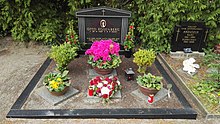Otto Rosenberg
Otto Rosenberg (born April 28, 1927 in Draugupönen , Pillkallen district ( East Prussia , today Kaliningrad Oblast ), † July 4, 2001 in Berlin ) was co-founder and long-term chairman of the regional association of German Sinti and Roma Berlin-Brandenburg.
Live and act
Otto Rosenberg grew up in Berlin. There he also attended elementary school. For the Olympic Games in 1936 , he and other Berlin Sinti and Roma were sent to the Berlin-Marzahn forced camp (then called the Marzahn Gypsy Rest Area). Here Otto Rosenberg was also examined by the Nazi "gypsy researchers" Robert Ritter and Eva Justin . On April 14, 1943, the 16-year-old and his family were deported to the Auschwitz concentration camp . The prisoner number Z 6084 was tattooed on him. Much of his family was murdered, such as his biological father, grandmother Charlotte Rosenberg and all ten siblings. Otto Rosenberg not only survived Auschwitz, he also survived the Buchenwald , Dora and Bergen-Belsen camps .
Otto Rosenberg is the father of four sons and three daughters, including the pedagogue Petra Rosenberg and the singer Marianne Rosenberg .
After the end of National Socialism, Rosenberg moved to Berlin because he considered himself a Sinto-German and was politically active there. He was a board member of the Central Council of German Sinti and Roma and first chairman of the Berlin-Brandenburg regional association of German Sinti and Roma . Rosenberg was a long-time member of the SPD and appeared at numerous public events on historical and political topics.
His autobiography The Burning Glass has been translated into Italian, English and Polish. In the shocking book he reported, among other things, about Josef Mengele , the camp doctor at Auschwitz, whose shoes he had to clean, how he left a few cigarettes as a thank you and the inmates fearfully expressed:
- Now he's coming again. Now he is getting what he needs again.
On February 17, 2001, already seriously ill, Rosenberg and Reimar Gilsenbach wrote the magazine article about the extras from the “gypsy camps” in Berlin and Salzburg in Leni Riefenstahl's film Tiefland for the Berliner Zeitung . In the old photos he recognized his uncle Balthasar Kretzmer, who was deported to Auschwitz :
- When they deported him to Auschwitz, he was already 52. At that age, there was no prisoner a chance of survival. Like most of our family, he never came back.
Rosenberg is buried in the New St. Michael Cemetery on Tempelhofer Gottlieb-Dunkel-Strasse . In December 2007, a street and a square were named after Otto Rosenberg at the historic site of the forced camp in Berlin-Marzahn. His grave has been designated as an honorary grave of the city of Berlin since July 2016 .
Publications
- Otto Rosenberg: The burning glass . Autobiography, recorded by Ulrich Enzensberger , foreword by Klaus Schütz , Eichborn-Verlag, Berlin 1998, Knaur-Taschenbuch, Munich 2002, ISBN 3-426-61815-X ; New edition of Wagenbach-Verlag, Berlin 2012, ISBN 978-3-8031-2692-4 . (Translation into Polish: Palace szkło ... Wyd Relacji wysłuchał Ulrich Enzensberger Przedm do polskiego Petra Rosenberg Słowo wstępne Klaus Schütz Przekł Ewa Kowynia Kraków:.... Tow Autorów i Wydawców Prac Naukowych Universitas 2010. ISBN 978-83-242- 1284-2 , translation into English under the title A gypsy in Auschwitz , London: London House 1999, ISBN 1-902809-02-5 )
- Reimar Gilsenbach , Otto Rosenberg: Riefenstahl's list. In memory of the murdered extras. In: Magazine of the Berliner Zeitung . February 17, 2001, accessed January 25, 2014
Awards
- In 1998 he received the Federal Cross of Merit, 1st class.
Web links
- Literature by and about Otto Rosenberg in the catalog of the German National Library
- Otto Rosenberg. Biography. In: Anne Frank Webguide
- Otto Rosenberg. Short biography. In: Regional Association of German Sinti and Roma Berlin-Brandenburg e. V.
Individual evidence
- ↑ The year of birth was given in many places as 1923, but April 28, 1927 is given on the tombstone, and the date of birth April 28, 1927 is also given in the main book of the " Auschwitz Gypsy Camp ".
- ^ Died - Otto Rosenberg. In: Der Spiegel (obituary). July 16, 2001
- ^ Main book of the "Auschwitz Gypsy Camp", p. 179 (= memorial book, p. 1086 f.)
- ↑ Ten siblings count The connection has never been broken (interview with Petra Rosenberg ). In: taz.de . October 18, 2004. Eleven siblings with Anne Klesse: She belongs to us (Berlin walk with Marianne Rosenberg ). In: Berliner Morgenpost . October 23, 2011. Nine siblings according to Otto Rosenberg. In: Anne Frank Webguide
- ↑ Otto Rosenberg. In: Anne Frank Webguide
- ↑ Götz Aly : Now an angel is covering this shame (obituary). In: Berliner Zeitung . July 10, 2001, accessed January 25, 2014
- ↑ Otto-Rosenberg-Straße and Otto-Rosenberg-Platz - street renaming at the authentic location. Press release Marzahn-Hellersdorf District Office, December 17, 2007
| personal data | |
|---|---|
| SURNAME | Rosenberg, Otto |
| BRIEF DESCRIPTION | German association functionary, representative of the Sinti and Roma |
| DATE OF BIRTH | April 28, 1927 |
| PLACE OF BIRTH | Draugupönen , East Prussia |
| DATE OF DEATH | 4th July 2001 |
| Place of death | Berlin |
